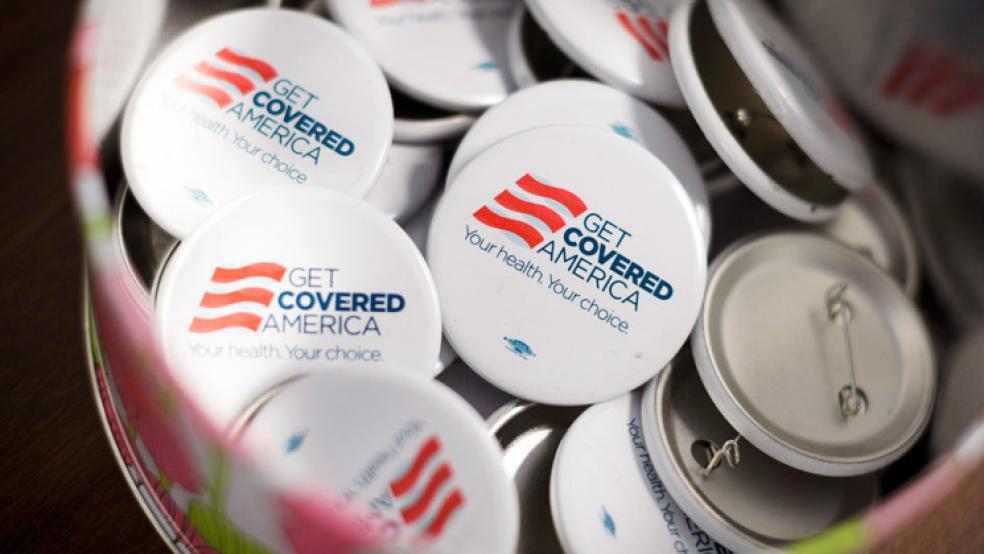Now that Congress is back in Washington with a Republican majority, you can expect another symbolic Obamacare repeal vote that will be quickly quashed by the president’ veto pen. But there are a number of actual fixes to the health law and other health policies that Congress could realistically take up this year—maybe even in bipartisan fashion.
The issues all include policy tweaks that likely require congressional action. They range in unintended consequences from the way the law was written that are disproportionately affecting poor people, to an expiring insurance program for low-income children (the Children’s Health Insurance Program or CHIP) that needs to be reauthorized by the end of the year.
Related: GOP-- Fix the $28B Medical Device Tax
There are other pieces of Obamacare that lawmakers will likely also take up—including potentially repealing the law’s medical device tax, as well as the employer mandate—though that one is less likely.
Both of those issues also have bipartisan support in Congress; however, it’s more plausible that lawmakers tweak the law’s language than make actual policy changes.
For example, a flaw in the way the Internal Revenue Service wrote regulatory rules under the law created something called the “family glitch” that made health insurance unaffordable for millions of people—many in the low-income bracket.
Lawmakers on both sides of the aisle have introduced measures to fix the glitch, but with the combination of usual gridlock and the midterm elections, they’ve been hesitant to make any real attempts to get rid of it.
These issues have support from both sides of the aisle, however, it is unclear how productive the 114ths Congress will be.
Related: Primary Care Docs to Lose Their Medicaid Raises
Here are the three health policy fixes lawmakers could reasonably make this year:
The Family Glitch
The “family glitch” is an unintended consequence of the law’s language. When the Internal Revenue Service wrote the regulatory rules defining who’s eligible to receive federal subsidies, it said people who have access to employer health care can’t qualify for subsidies, nor can their families. Under the law’s employer mandate, midsized to large employers are required to cover individuals and offer affordable coverage—(about 9.5 percent of household income.)
So, when a person has access to health care through their employer, but the rest of their family isn’t covered—their family members still are deemed ineligible to receive financial help through the exchanges because of the way the law was written. Most policy experts and lawmakers agree that this was not what the law intended, which is why there are a number of proposals to try and remedy it.
For example, Sen. Al Franken (D-MN) introduced a bill that would amend the law to determine affordability based on the cost of family-based coverage---not just an individual’s. The bill also says the administration has authority to adjust the language so families can receive the subsidies. According to the American Action Forum, if lawmakers do nothing to address the glitch more than 1.93 million Americans will be affected.
Related: Obamacare Enrollees Could Get Hit with Surprise Costs
Reauthorizing CHIP
The Children’s Health Insurance Program, a federal-state partnership insurance program for poor children, is set to run out of funding in September. Congress has until then to reauthorize funding for the program or millions of kids will lose their health coverage. Right now, about 6 million children receive health care through CHIP.
In June, the Medicaid and CHIP Payment Access Commission (MACPAC) called on Congress to extend CHIP for two years to allow time to make policy changes that would make the Affordable Care Act better serve children. So far, there are two pieces of legislation, one in the House and one in the Senate, that propose new funding for CHIP. Just last month, a bipartisan group of 39 governors signed a letter of support for a four-year funding extension for CHIP. Still, it’s unclear if we’ll see similar bipartisanship in Washington before September.
Fixing Pay-for-Performance
The Affordable Care Act’s pay-for-performance provision was supposed to improve the quality of care and get the U.S. health care system away form the traditional fee-for-service model. But because the program evaluates performance by a hospital’s readmission rates, it’s unfairly penalizing hospitals that serve primarily poor populations.
Here’s how it works: Medicare and private insurance companies pay providers based on their performance and patient outcomes. If a hospital has high readmission rates, it gets penalized. If readmission rates are low, the hospital gets more funding. Though the intention is good—reward good hospitals and doctors, punish the bad ones.
Related: Gruber Won’t Say How Much He Made as Obamacare Architect
But it’s not that simple. Since, low-income patients are less likely to have successful outcomes (they may not be able to afford medication or transportation to get to their treatments) the hospitals primarily serving them may be unfairly labeled as “poor performers” and get hit with penalties. A panel of 26 experts commissioned by the Obama administration earlier this year recommended that the program should take the socioeconomic status of patients into account when evaluating hospitals. And lawmakers have listened.
In June, Sens. Joe Manchin (D-WV), Roger Wicker (R-MS), Mark Kirk (R-IL) and Bill Nelson (D-FL), proposed a bipartisan bill that would require Medicare to account for the socioeconomic status of each patient when calculating penalties. The measure received support from lawmakers on both sides of the aisle as well as a handful of health policy experts.
Still, like the other fixes, it’s unclear if a new divided government will actually make real progress this year.
Top Reads from The Fiscal Times:
- FEMA Does It Again: Overpays $177 Million in Hurricane Relief
- McConnell Previews GOP Agenda of Compromise, Confrontation
- What Paul Krugman and Ezra Klein Get Wrong on Tarp


